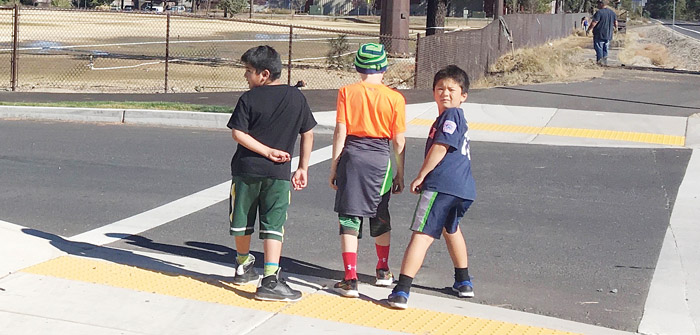(Photo above: Crosswalks | Photo Courtesy of Commute Options)
You may have seen the infamous skit from Portlandia, a television comedy that takes place in Portland. The scene is a four-way intersection, with four cars waiting to proceed. The problem is, everyone is so polite that they sit there for hours and wave each other on. “No, no. You go,” and “No, you go. It’s your turn.”
As a driver, you may have done the same thing by waving on a pedestrian or bicyclist to cross a street. But, do you really know the rules of the road when a pedestrian or bicyclist is crossing a road? Let’s take a look at Oregon’s rules of the road for crosswalks and crossings.
Pedestrian Crossing Rules
The first thing to understand is that anyone traveling on foot or by wheelchair is a pedestrian. The second thing is to know the definition of a crosswalk. A crosswalk can be a marked crossing, like a typical crosswalk with painted lines. Crosswalks can also be unmarked. In Oregon, ANY intersection, where two roads cross each other, is considered a crosswalk—whether it is marked or not.
• Vehicles must stop when a pedestrian is crossing a roadway at a marked or unmarked crosswalk. A pedestrian is considered to be crossing when any part or extension of the body moves into the roadway in a crosswalk. Even if it is just a toe.
• When a pedestrian is crossing a road where there is no crosswalk (no intersections or corners), vehicles are not required to stop. Simply put, if you see a person visibly trying to cross a street at a corner, you are required to stop your vehicle and let them cross.
Bicycle Crossing Rules
A person riding a bicycle is considered to be a vehicle. The rules of the road apply to them very much like they apply to a vehicle. However, a person walking a bicycle is considered to be a pedestrian.
• When a person riding a bicycle is crossing a road at a marked or unmarked crosswalk, (any intersection of two roads), vehicles are NOT required to stop and let the bicycle cross. The bicycle must wait until it is safe to cross.
• When a person riding a bicycle is crossing a road with no crosswalk, corner or intersection, the bicyclist must wait until it is safe to cross. Vehicles are NOT required to stop to let the bicyclist cross.
So, what do you do as a driver? If you see a pedestrian at an intersection with clear intent to cross, you are required to stop. If you see a person riding a bike trying to cross, you are not required to stop. Stopping for a bicycle can create a more dangerous situation because cars traveling in the other direction may not stop. Additionally, stopping for a bicyclist crossing a four-lane road can be dangerous for the bicyclist because the other lane of traffic may not see or stop for the bicyclist. And remember, if you see a person walking a bicycle, they are considered to be a pedestrian!
Brian Potwin, Education Coordinator at Commute Options is an excellent resource on the rules of the road. Contact Brian at brian@commuteoptions.org
Celebrating 25 years of Commute Options! Promoting choices that reduce the impacts of driving alone. For more information, contact Executive Director, Jeff Monson at 541-330-2647 or visit www.commuteoptions.org
Katy Bryce is a freelance writer in Bend. www.katybryce.com





1 Comment
Years ago I was told there was an exception to the rule about implied or unmarked crosswalks and that was when it crossed a highway. If the pedestrian wanted to cross a highway, there was no unmarked crosswalk and drivers were not required to stop unless they were in a marked crosswalk. Was that incorrect? Did that change?